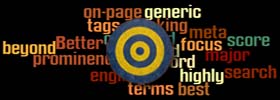Keyword Targeting and Page Density
 Better keyword ranking requires an optimized focus. There’s more to on-page optimization than meta tags. It all starts with well chosen key word phrases. How do we develop the best keyword set?
Better keyword ranking requires an optimized focus. There’s more to on-page optimization than meta tags. It all starts with well chosen key word phrases. How do we develop the best keyword set?
The key to a successful phrase selection is what I call “tight targeting.” Avoid being too general. Break the topic down into its basic elements and make a page for each. Use two and three word combinations to target a very specific niche or description.
Each subsection should also have its core keywords and be tuned for them, which means proper placement in each of the ten html areas of a page. This adds up to the keyword frequency.
Gather the best generic terms for your product or service. Identify two and three word phrases with the most searchers and the fewest competing websites. The technical name for the advantage you’re seeking is a high Keyword Effectiveness Index or KEI. One caveat: this metric does not necessarily guarantee a high-quality phrase.
You can identify these winning two and three word phrases by brainstorming and using keyword generators. Wordtracker may be the single most comprehensive keyword research tool you can use today. A dictionary or thesaurus can also be a great help.
Placed at the beginning of these areas, keywords are said to have prominence and score highly for that requirement. When they appear once in each area, they may satisfy frequency and page distribution requirements.
Hint: find synonyms in Google by using the “~” character directly in front of the search word. You might be surprised to see the results in bold which indicate your new equivalent word(s).
Go beyond meta tags for keyword search results success. Meta tags and how much to use them or not has been a much talked about topic. Webmasters who want to do a comprehensive optimization job for all of the major search engines will produce a complete set of meta tags. The three most important meta tag elements are: the title, description and keywords. Your home page keywords list reflect the site’s main theme.
A key to consistent success is this tip: use the same first three words in all three tags. For good keyword relevancy only include words in your meta keywords tag that appear on the page. This technique also works for all directory listings you want to acquire.
You may find tag generators helpful to get you started. The main concept is to identify words and phrases within the text on the page and use them. Include plurals and any other suffix variations of the words. There can be too many words in the the keyword and description areas, so use what you might consider a short list. One more tip: don’t repeat the same word in a tag. Once each will do it!
One more element is to add a “robots” meta tag. You want the search engine “bot” to search your page, index the text and follow (content=”index,follow”) all links to other pages.
When the topical content of your site is planned and written, you’re ready for the next level. Learn how to increase your link popularity within your site and why it’s important.
Related articles
- Diluting Your Keywords Can Kill You (organicseoconsultant.com)
- Meta Tag Optimization 101 (morevisibility.com)
- What is in “on page” seo (wiki.answers.com)
